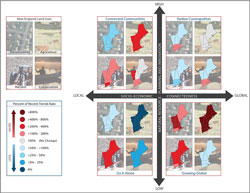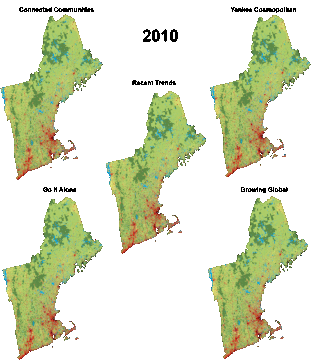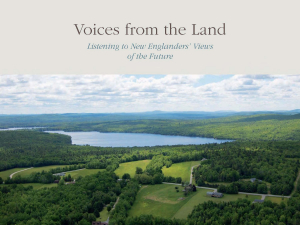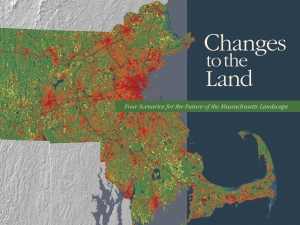You are here
Future Scenarios
The New England Landscape Futures Project is an initiative led by the Harvard Forest as a focus of its Long-Term Ecological Research program and the now retired Scenarios, Services, and Society Research Coordination Network (S3 RCN) in collaboration with scientists and stakeholders from throughout the region who are dedicated to understanding possible trends and impacts of landscape change in New England. Working together as a community of scientists, business owners, government officials, landowners and non-profit representatives, we developed and analyed a set of alternative landscape futures (or, "scenarios") for New England and comparing them to "business as usual." The results inform real world decisions about: forest management, land-use planning, green and gray infrastructure investment, and conservation priority-setting.
The project was established in 2014 with support from the Harvard Forest, the National Science Foundation through a Long Term Ecological Research grant and Research Coordination Grant, and the Highstead Foundation. The project was founded by HF Senior Ecologist Jonathan Thompson and Director of the Science Policy Exchange Kathy Fallon Lambert and continues with leadership by the Thompson Lab.
![]() The process of co-designing future scenarios took place in 2014 and 2015 and incorporated input from more than 200 relevant stakeholders and scientists through an iterative process that combined workshops, semistructured interviews, and open-ended conversations. The novel approach to scenario development is described in their paper: "Increasing the effectiveness of participatory scenario development through codesign." The process concluded with the development of narrative scenarios that describe four alternative futures for New England that differ along two axes that the participants identified as highly impactful and highly uncertain, they are: local to global socio-economic connectedness and low to high natural resource planning and innovation. Read the full narrative describing these future worlds.
The process of co-designing future scenarios took place in 2014 and 2015 and incorporated input from more than 200 relevant stakeholders and scientists through an iterative process that combined workshops, semistructured interviews, and open-ended conversations. The novel approach to scenario development is described in their paper: "Increasing the effectiveness of participatory scenario development through codesign." The process concluded with the development of narrative scenarios that describe four alternative futures for New England that differ along two axes that the participants identified as highly impactful and highly uncertain, they are: local to global socio-economic connectedness and low to high natural resource planning and innovation. Read the full narrative describing these future worlds. 
The stakeholders then translated their qualitative descriptions into quantitative differences in the amount, intensity, and spatial distribution of development, timber harvest, agriculture, and land protection. Harvard Forest researchers then simulated the scenarios using land cover change and ecosystem process models.
 Outputs from these models are publically available on Databasin and via a web-tool called the New England Landscape Futures (NELF) Explorer. The team is now working to understand how these scenarios affect key socio-ecological variables.
Outputs from these models are publically available on Databasin and via a web-tool called the New England Landscape Futures (NELF) Explorer. The team is now working to understand how these scenarios affect key socio-ecological variables.
| The 2018 publication of Voices from the Land highlights New Englanders' views about the changing landscape, forming the basis for the four possible future scenarios. |  |
The 2013 Changes to the Land report was a pilot project in Massachusetts before we scaled to New England.


